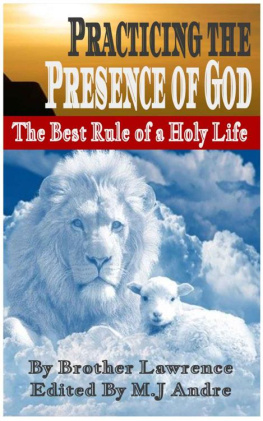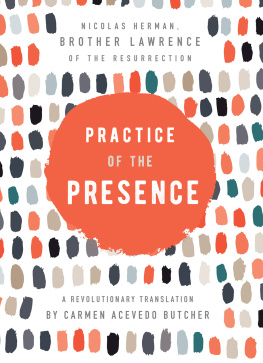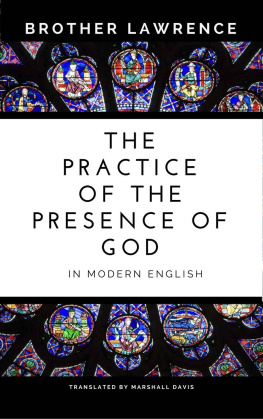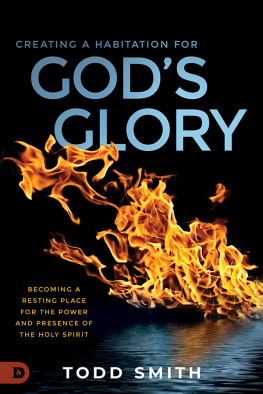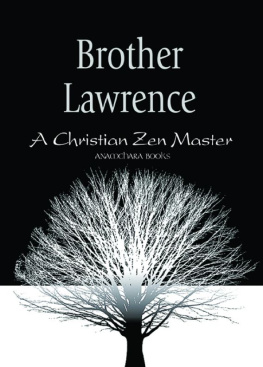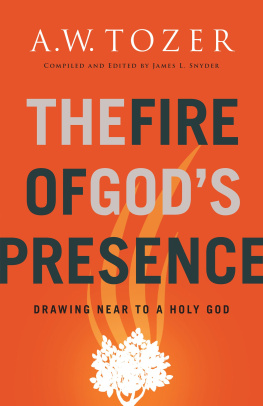Brother Lawrence - Practicing The Presence Of God The Best Rule of a Holy Life
Here you can read online Brother Lawrence - Practicing The Presence Of God The Best Rule of a Holy Life full text of the book (entire story) in english for free. Download pdf and epub, get meaning, cover and reviews about this ebook. year: 2013, publisher: Fearless Eagle Publishing, genre: Religion. Description of the work, (preface) as well as reviews are available. Best literature library LitArk.com created for fans of good reading and offers a wide selection of genres:
Romance novel
Science fiction
Adventure
Detective
Science
History
Home and family
Prose
Art
Politics
Computer
Non-fiction
Religion
Business
Children
Humor
Choose a favorite category and find really read worthwhile books. Enjoy immersion in the world of imagination, feel the emotions of the characters or learn something new for yourself, make an fascinating discovery.
- Book:Practicing The Presence Of God The Best Rule of a Holy Life
- Author:
- Publisher:Fearless Eagle Publishing
- Genre:
- Year:2013
- Rating:3 / 5
- Favourites:Add to favourites
- Your mark:
- 60
- 1
- 2
- 3
- 4
- 5
Practicing The Presence Of God The Best Rule of a Holy Life: summary, description and annotation
We offer to read an annotation, description, summary or preface (depends on what the author of the book "Practicing The Presence Of God The Best Rule of a Holy Life" wrote himself). If you haven't found the necessary information about the book — write in the comments, we will try to find it.
Practicing The Presence Of God The Best Rule of a Holy Life — read online for free the complete book (whole text) full work
Below is the text of the book, divided by pages. System saving the place of the last page read, allows you to conveniently read the book "Practicing The Presence Of God The Best Rule of a Holy Life" online for free, without having to search again every time where you left off. Put a bookmark, and you can go to the page where you finished reading at any time.
Font size:
Interval:
Bookmark:
Practicing
The Presence
Of God
By Brother Lawrence
CHECK OUT THESE KINDLES:
THE SOLDIERS OF THE KING: Their Warfare, Weapons and Victory "Put on the Armour of God"
CLICK HERE
THE BOOK OF REVELATION: A Study of The Last Prophetic Book of Holy Scriptures, 1919 Kindle Edition CLICK HERE
FREEDOM OF THE WILL by Jonathan Edwards, Kindle Edition
CLICK HERE
THE ART OF PROPHESYING with The Calling of the Ministry: A Needed Tool for All Pastors Kindle Edition CLICK HERE
Deeper In Your Word Through Bible Verses & Christian Quotes That Nourish My Soul Kindle Edition
CLICK HERE
Practice The Presence Of God
By Brother Lawrence
Copyright 2013
Published by Fearless Eagle Publishing
ISBN: 978-0-9881287-1-2
M.J.Andre
Toronto, Ontario
Lawrence, Brother (Nicholas Herman, c. 1605-1691)
Source: Wikipedia
Brother Lawrence was born Nicholas Herman in the region of Lorraine, located in modern day eastern France. He received a revelation of the providence and power of God at the age of 18, but it would be another six years before he joined the Discalced Carmelite Prior in Paris. In this intervening period he fought in the Thirty Years' War and later served as a valet.
Nicholas entered the priory in Paris as a lay brother, not having the education necessary to become a cleric, and took the religious name, "Lawrence of the Resurrection". He spent almost all of the rest of his life within the walls of the priory, working in the kitchen for most of his life and as a repairer of sandals in his later years.
Yet despite, or perhaps because of, his somewhat lowly position, his character attracted many to him. He was known for his profound peace and many came to seek spiritual guidance from him. The wisdom that he passed on to them, in conversations and in letters, would later become the basis for the book, The Practice of the Presence of God . This work was compiled after Brother Lawrence died by one of those whom he inspired, Father Joseph de Beaufort, later vicar general to the Archbishop of Paris. It became popular among Catholics and Protestants alike, with John Wesley and A. W. Tozer being among those who recommended it.
As a young man, Herman's poverty forced him into joining the army, and thus he was guaranteed meals and a small stipend. During this period, Herman had an experience that set him on a unique spiritual journey; it wasn't, characteristically, a supernatural vision, but a supernatural clarity into a common sight.
In the deep of winter, Herman looked at a barren tree, stripped of leaves and fruit, waiting silently and patiently for the sure hope of summer abundance. Gazing at the tree, Herman grasped for the first time the extravagance of God's grace and the unfailing sovereignty of divine providence. Like the tree, he himself was seemingly dead, but God had life waiting for him, and the turn of seasons would bring fullness. At that moment, he said, that leafless tree "first flashed in upon my soul the fact of God," and a love for God that never after ceased to burn. Sometime later, an injury forced his retirement from the army, and after a stint as a footman, he sought a place where he could suffer for his failures. He thus entered the Discalced Carmelite monastery in Paris as Brother Lawrence.
He was assigned to the monastery kitchen where, amidst the tedious chores of cooking and cleaning at the constant bidding of his superiors, he developed his rule of spirituality and work. In his Maxims, Lawrence writes, "Men invent means and methods of coming at God's love, they learn rules and set up devices to remind them of that love, and it seems like a world of trouble to bring oneself into the consciousness of God's presence. Yet it might be so simple. Is it not quicker and easier just to do our common business wholly for the love of him?"
For Brother Lawrence, "common business," no matter how mundane or routine, was the medium of God's love. The issue was not the sacredness or worldly status of the task but the motivation behind it. "Nor is it needful that we should have great things to do... We can do little things for God; I turn the cake that is frying on the pan for love of him, and that done, if there is nothing else to call me, I prostrate myself in worship before him, who has given me grace to work; afterwards I rise happier than a king. It is enough for me to pick up but a straw from the ground for the love of God."
Brother Lawrence retreated to a place in his heart where the love of God made every detail of his life of surpassing value. "I began to live as if there were no one save God and me in the world." Together, God and Brother Lawrence cooked meals, ran errands, scrubbed pots, and endured the scorn of the world.
He admitted that the path to this perfect union was not easy. He spent years disciplining his heart and mind to yield to God's presence. "As often as I could, I placed myself as a worshiper before him, fixing my mind upon his holy presence, recalling it when I found it wandering from him. This proved to be an exercise frequently painful, yet I persisted through all difficulties."
Only when he reconciled himself to the thought that this struggle and longing was his destiny did he find a new peace: his soul "had come to its own home and place of rest." There he spent the rest of his 80 years, dying in relative obscurity and pain and perfect joy.
First Conversation
Conversion and previous employment
Satisfaction in God's presence. Faith our duty
Resignation the fruit of watchfulness.
The first time I saw Brother Lawrence was upon the 3rd of August, 1666. He told me that God had done him a singular favor in his conversion at the age of eighteen. During that winter, upon seeing a tree stripped of its leaves and considering that within a little time the leaves would be renewed and after that the flowers and fruit appear, Brother Lawrence received a high view of the Providence and Power of God which has never since been effaced from his soul. This view had perfectly set him loose from the world and kindled in him such a love for God, that he could not tell whether it had increased in the forty years that he had lived since.
Brother Lawrence said he had been footman to M. Fieubert, the treasurer, and that he was a great awkward fellow who broke everything. He finally decided to enter a monastery thinking that he would there be made to smart for his awkwardness and the faults he would commit, and so he would sacrifice his life with its pleasures to God. But Brother Lawrence said that God had surprised him because he met with nothing but satisfaction in that state.
Brother Lawrence related that we should establish ourselves in a sense of God's Presence by continually conversing with Him. It was a shameful thing to quit His conversation to think of trifles and fooleries. We should feed and nourish our souls with high notions of God which would yield us great joy in being devoted to Him.
He said we ought to quicken and enliven our faith. It was lamentable we had so little. Instead of taking faith for the rule of their conduct, men amused themselves with trivial devotions which changed daily. He said that faith was sufficient to bring us to a high degree of perfection. We ought to give ourselves up to God with regard both to things temporal and spiritual and seek our satisfaction only in the fulfilling of His will. Whether God led us by suffering or by consolation all would be equal to a soul truly resigned.
He said we need fidelity in those disruptions in the ebb and flow of prayer when God tries our love to Him. This was the time for a complete act of resignation, whereof one act alone could greatly promote our spiritual advancement.
Font size:
Interval:
Bookmark:
Similar books «Practicing The Presence Of God The Best Rule of a Holy Life»
Look at similar books to Practicing The Presence Of God The Best Rule of a Holy Life. We have selected literature similar in name and meaning in the hope of providing readers with more options to find new, interesting, not yet read works.
Discussion, reviews of the book Practicing The Presence Of God The Best Rule of a Holy Life and just readers' own opinions. Leave your comments, write what you think about the work, its meaning or the main characters. Specify what exactly you liked and what you didn't like, and why you think so.

